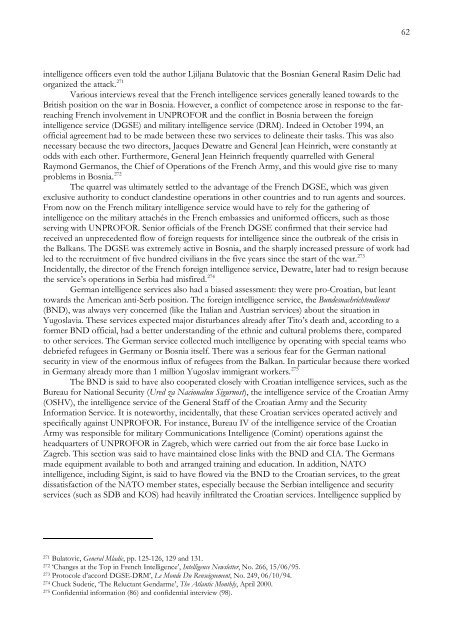C. Wiebes - Intelligence en de oorlog in Bosnië 1992-1995. De rol van de inlichtingen- en veiligheidsdiensten - Engels
C. Wiebes - Intelligence en de oorlog in Bosnië 1992-1995. De rol van de inlichtingen- en veiligheidsdiensten - Engels
C. Wiebes - Intelligence en de oorlog in Bosnië 1992-1995. De rol van de inlichtingen- en veiligheidsdiensten - Engels
- No tags were found...
Create successful ePaper yourself
Turn your PDF publications into a flip-book with our unique Google optimized e-Paper software.
62<strong>in</strong>tellig<strong>en</strong>ce officers ev<strong>en</strong> told the author Ljiljana Bulatovic that the Bosnian G<strong>en</strong>eral Rasim <strong>De</strong>lic hadorganized the attack. 271Various <strong>in</strong>terviews reveal that the Fr<strong>en</strong>ch <strong>in</strong>tellig<strong>en</strong>ce services g<strong>en</strong>erally leaned towards to theBritish position on the war <strong>in</strong> Bosnia. However, a conflict of compet<strong>en</strong>ce arose <strong>in</strong> response to the farreach<strong>in</strong>gFr<strong>en</strong>ch <strong>in</strong>volvem<strong>en</strong>t <strong>in</strong> UNPROFOR and the conflict <strong>in</strong> Bosnia betwe<strong>en</strong> the foreign<strong>in</strong>tellig<strong>en</strong>ce service (DGSE) and military <strong>in</strong>tellig<strong>en</strong>ce service (DRM). In<strong>de</strong>ed <strong>in</strong> October 1994, anofficial agreem<strong>en</strong>t had to be ma<strong>de</strong> betwe<strong>en</strong> these two services to <strong>de</strong>l<strong>in</strong>eate their tasks. This was alsonecessary because the two directors, Jacques <strong>De</strong>watre and G<strong>en</strong>eral Jean He<strong>in</strong>rich, were constantly atodds with each other. Furthermore, G<strong>en</strong>eral Jean He<strong>in</strong>rich frequ<strong>en</strong>tly quarrelled with G<strong>en</strong>eralRaymond Germanos, the Chief of Operations of the Fr<strong>en</strong>ch Army, and this would give rise to manyproblems <strong>in</strong> Bosnia. 272The quarrel was ultimately settled to the ad<strong>van</strong>tage of the Fr<strong>en</strong>ch DGSE, which was giv<strong>en</strong>exclusive authority to conduct clan<strong>de</strong>st<strong>in</strong>e operations <strong>in</strong> other countries and to run ag<strong>en</strong>ts and sources.From now on the Fr<strong>en</strong>ch military <strong>in</strong>tellig<strong>en</strong>ce service would have to rely for the gather<strong>in</strong>g of<strong>in</strong>tellig<strong>en</strong>ce on the military attachés <strong>in</strong> the Fr<strong>en</strong>ch embassies and uniformed officers, such as thoseserv<strong>in</strong>g with UNPROFOR. S<strong>en</strong>ior officials of the Fr<strong>en</strong>ch DGSE confirmed that their service hadreceived an unpreced<strong>en</strong>ted flow of foreign requests for <strong>in</strong>tellig<strong>en</strong>ce s<strong>in</strong>ce the outbreak of the crisis <strong>in</strong>the Balkans. The DGSE was extremely active <strong>in</strong> Bosnia, and the sharply <strong>in</strong>creased pressure of work hadled to the recruitm<strong>en</strong>t of five hundred civilians <strong>in</strong> the five years s<strong>in</strong>ce the start of the war. 273Incid<strong>en</strong>tally, the director of the Fr<strong>en</strong>ch foreign <strong>in</strong>tellig<strong>en</strong>ce service, <strong>De</strong>watre, later had to resign becausethe service’s operations <strong>in</strong> Serbia had misfired. 274German <strong>in</strong>tellig<strong>en</strong>ce services also had a biased assessm<strong>en</strong>t: they were pro-Croatian, but leanttowards the American anti-Serb position. The foreign <strong>in</strong>tellig<strong>en</strong>ce service, the Bun<strong>de</strong>snachricht<strong>en</strong>di<strong>en</strong>st(BND), was always very concerned (like the Italian and Austrian services) about the situation <strong>in</strong>Yugoslavia. These services expected major disturbances already after Tito’s <strong>de</strong>ath and, accord<strong>in</strong>g to aformer BND official, had a better un<strong>de</strong>rstand<strong>in</strong>g of the ethnic and cultural problems there, comparedto other services. The German service collected much <strong>in</strong>tellig<strong>en</strong>ce by operat<strong>in</strong>g with special teams who<strong>de</strong>briefed refugees <strong>in</strong> Germany or Bosnia itself. There was a serious fear for the German nationalsecurity <strong>in</strong> view of the <strong>en</strong>ormous <strong>in</strong>flux of refugees from the Balkan. In particular because there worked<strong>in</strong> Germany already more than 1 million Yugoslav immigrant workers. 275The BND is said to have also cooperated closely with Croatian <strong>in</strong>tellig<strong>en</strong>ce services, such as theBureau for National Security (Ured za Nacionalnu Sigurnost), the <strong>in</strong>tellig<strong>en</strong>ce service of the Croatian Army(OSHV), the <strong>in</strong>tellig<strong>en</strong>ce service of the G<strong>en</strong>eral Staff of the Croatian Army and the SecurityInformation Service. It is noteworthy, <strong>in</strong>cid<strong>en</strong>tally, that these Croatian services operated actively andspecifically aga<strong>in</strong>st UNPROFOR. For <strong>in</strong>stance, Bureau IV of the <strong>in</strong>tellig<strong>en</strong>ce service of the CroatianArmy was responsible for military Communications <strong>Intellig<strong>en</strong>ce</strong> (Com<strong>in</strong>t) operations aga<strong>in</strong>st theheadquarters of UNPROFOR <strong>in</strong> Zagreb, which were carried out from the air force base Lucko <strong>in</strong>Zagreb. This section was said to have ma<strong>in</strong>ta<strong>in</strong>ed close l<strong>in</strong>ks with the BND and CIA. The Germansma<strong>de</strong> equipm<strong>en</strong>t available to both and arranged tra<strong>in</strong><strong>in</strong>g and education. In addition, NATO<strong>in</strong>tellig<strong>en</strong>ce, <strong>in</strong>clud<strong>in</strong>g Sig<strong>in</strong>t, is said to have flowed via the BND to the Croatian services, to the greatdissatisfaction of the NATO member states, especially because the Serbian <strong>in</strong>tellig<strong>en</strong>ce and securityservices (such as SDB and KOS) had heavily <strong>in</strong>filtrated the Croatian services. <strong>Intellig<strong>en</strong>ce</strong> supplied by271 Bulatovic, G<strong>en</strong>eral Mladic, pp. 125-126, 129 and 131.272 ‘Changes at the Top <strong>in</strong> Fr<strong>en</strong>ch <strong>Intellig<strong>en</strong>ce</strong>’, <strong>Intellig<strong>en</strong>ce</strong> Newsletter, No. 266, 15/06/95.273 Protocole d’accord DGSE-DRM’, Le Mon<strong>de</strong> Du R<strong>en</strong>seignem<strong>en</strong>t, No. 249, 06/10/94.274 Chuck Su<strong>de</strong>tic, ‘The Reluctant G<strong>en</strong>darme’, The Atlantic Monthly, April 2000.275 Confid<strong>en</strong>tial <strong>in</strong>formation (86) and confid<strong>en</strong>tial <strong>in</strong>terview (98).





